The Revolution of 1911
Wang Ronghua
Xin Hai Revolution or
Revolution of 1911
The Main Land Version
Wang Ronghua
 Sun Yat-sen孙中山
Sun Yat-sen孙中山
A Few Words about the Father of the Republic
•Sun Yat-sen or Sūn Zhōngshān (孙中山1866—1925), also named “Wén”, his formal name is “Yìxiān”, founder of the Chinese Nationalist Party, born in Xiāngshān County of Guangdong Province; when in exile in Japan, he also used the name of “Nakayama Shō ” (中山礁in Chinese), people used to address him as Mr. Zhongshan.
•In 1940,the national government issued a decree to the whole country praising Sun for his “advocacy of national revolution, founding of the republic, changing of political system, laying down the foundation of the country, seeking world harmony and international equality.” He was reputed as “the Father of the Republic of China.” The nationalists regarded him as the “Premier for ever.” The Chinese Communist party regarded him as “a revolutionary vanguard”. He has been taken on the mainland as “father of modern China,” and common folks address him as “Father of China.”•Sun Yat-sen was born on 12 November 1866 to a Hakka family in the village of Cuiheng, Xiangshan (later Zhongshan) county.
•After receiving a few years of local school, at age thirteen, Sun went to live with his elder brother, Sun Mei, in Honolulu. Sun Yat-sen studied at the Iolani School where he learned English, mathematics and science. Originally unable to speak the English language, Sun Yat-sen picked up the language so quickly that he received a prize for outstanding achievement from Prince David Kalakaua. While at Iolani, he befriended Tong Phong, who later founded the First Chinese-American Bank. After attending Iolani School, from which he graduated in 1882,Sun enrolled in Oahu College (now Punahou School) for further studies for one semester. He was soon sent home to China as his brother was becoming afraid that Sun Yat-sen was about to embrace Christianity, Sun studied English at the Anglican Diocesan Home and Orphanage (now the Diocesan Boys' School) in Hong Kong. In April 1884, Sun was transferred to the Central School of Hong Kong (later renamed Queen's College). Sun was later baptized in Hong Kong by an American missionary of the Congregational Church of the United States, to his brother's disdain. Sun pictured a revolution as similar to the salvation mission of the Christian church.
In 1894, Sun wrote a long letter to Li Hongzhang, the governor-general of Zhili and a reformer in the court, with suggestions on how to strengthen China, but he was rebuffed. Since Sun had never been trained in the classics, the gentry did not accept Sun into their circles. From then on, Sun began to call for the abolition of the monarchy and the establishment of a republic.

Lian Zhan paying respects at Zhongshan Tomb Mao Zedong’s comments: “The greatness of Mr. Sun Yat-sen lies not only In his leadership of the Xinhai Revolution, but also in his ability to adapt to world current, to the needs of the people, and his three revolutionary policies of uniting with Russia, the communist party and supporting workers and Farmers, which were new interpretations of the Three Principles of the People,The Three new principles that formulated the three new policies.Lǔ Xùn said that the whole life of Mr. Yat-sen was history, he engaged In revolution when he stood up, he carried on the revolution after the failure of the revolution; he sought no comfort after the founding of the Republic, He continued almost entirely with the revolution.Jiāng Zēmīn said at the rally marking the 90th anniversary of Xinhai Revolution:Mr. Sun Yat-sen is a great man in history who stood at the forefront of the times.Being a great patriotic and the great forerunner of China’s democratic revolution, he devoted all his efforts to national independence, democracy, freedom, the welfare and happiness of the people.
Revolution of 1911

The tide of the world surges forward with a mighty force, one lives on if he goes with it and one is doomed if he goes against it.The definition of the revolution of 1911 In its broader sense, it refers to the entire process of overthrowing the imperial system of the Qing Dynasty and the establishment of the bourgeois democratic republic by capitalist revolutionaries headed by Sun Yat-sen. In the narrow sense, it is equal to Wuchang Uprising because this uprising happened in Wuchang and in the year of Xinhai.
A、Wuchang Uprising——The brewing and outburst of revolution
1、Background and Conditions
2、The out-burst
B、The Founding of the Republic
1、The founding of the Republic
2、《The Provisional Law of the Republic》
C、The Ending of Xin Hai Revolution
1、Yuan Shikai usurped the fruits of the revolution
2、Historical merits of the revolution
3、The failure of the revolution
Wind Comes before Rain
A、Wuchang Uprising——the Brewing and outburst of revolution
(1)Situation at the time:The conclusion of《The International Protocol of 1901》deepened the national crisis.

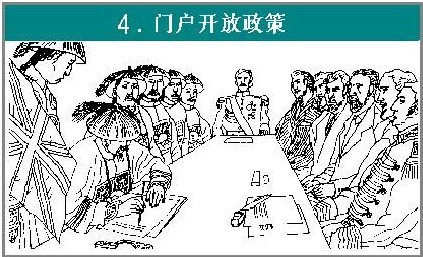
Foreign Powers were dividing China in 1899
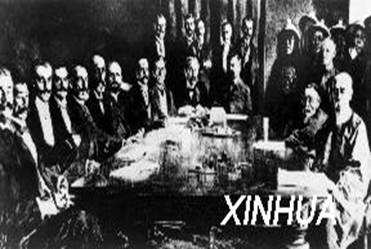
The conclusion in 1901《International Protocol》
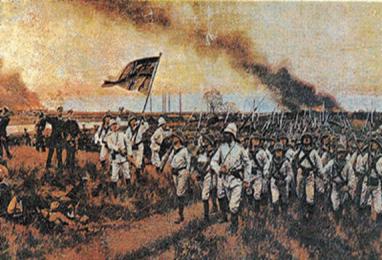
Invasion in 1900 by 8 Powers
A、Wuchang Uprising——the Brewing and outburst of revolution
(1)Situation at the time:The conclusion of《The International Protocol of 1901》deepened the national crisis.
(2)Social circumstance:New Deal of Late Qing and Failure of Preparation of Constitution“New Deal” at late Qing and “Preparatory Constitution”
1、Background:After conclusion of 《International Protocol》
In order to mitigate the conflicts with national bourgeois, the Empress Dowager could no longer continue with her rule as what it had been, the Qing government introduced “New Deal” in 1901 that included encouragement of industries, building of new schools, forming new army to replace the old military system and etc. However, in the process, the Qing government levied many more tax on the people.
Having came across with a damaging disaster, they learned that it wouldn’t do to keep everything as it was, they then did something new in only skin-deep. They hadn’t really done anything, only to block the ears and eyes of the people and making foreigners happy; the darkness was doubled without the smallest shed of light. –Chen Tianhua
“New Deal” at late Qing(1901):
1.In Politics the government set-up was changed, Ministry of Foreign Affairs (to replace the Premier’s office), Ministry of Commerce, Ministry of Civil Affairs and Political Consultative Conference were set up.
2. In economy encouraging industry and commerce;
3. In education imperial examination system was abolished, new schools were set up, students were sent abroad to study;
4. In military New army was formed to replace the old military system.
“New Deal” at late Qing and “Preparatory Constitution”
1、Background:after the conclusion of 《International Protocol》
2、Objective:to maintain their rule
3、Direct Objective:to settle disorder, to mitigate troubles caused by foreign powers and to consolidate the rule of the imperial family
4、Nature of their motive:reactionary
5、Effects in reality:promoted development of capitalism, created conditions for the bourgeois revolution.
A、Wuchang Uprising——the Brewing and outburst of revolution
(1)Situation at the time:The conclusion of《The International Protocol of 1901》deepened the national crisis.
(2)Social basis:failure of the new deal and the preparatory constitution
(3)Economic basis:the growing of national capitalism (as being pushed by the “new deal” and the preparatory constitution
(4)Class basis:The growing of national bourgeois that came onto the stage after the Sino-Japanese War.
Background Information
The Development of Chinese Capitalist Economy
There were over 50 factories, mines and enterprises opened by national capitalists from the 70s of the 19th century till the outbreak of Sino-Japanese War. The aggregated investment was Yuan 4.7 million, and averagely each year, there were two new enterprises.
There were 549 newly built factories and mines, each with an investment of over Yuan 100,000 in 1895—1913; the rate of increase was 15% in 1894—1913.
A、Wuchang Uprising——the Brewing and outburst of revolution
1、Background and Conditions
(1)Situation at the time:The conclusion of《The International Protocol of 1901》deepened the national crisis.
(2)Social basis:failure of the new deal and the preparatory constitution
(3)Economic basis:the growing of national capitalism (as being pushed by the “new deal” and the preparatory constitution)
(4)Class basis:The growing of national bourgeois that came onto the stage after the Sino-Japanese War.
(5)Ideological Basis:the dissemination of bourgeois democratic revolutionary ideasthe dissemination of bourgeois democratic revolutionary ideas
1、Condition: The team of revolutionary intellectuals grew quickly owing to new schools and overseas studies
2、Ideological Weapon: human rights are endowed by heaven 、
Freedom and equality
3、Two Centers: Shanghai、Tokyo
4、Three Thinkers: Zhāng Bǐnglīn、Zóu Róng、Chēn Tīanhuá
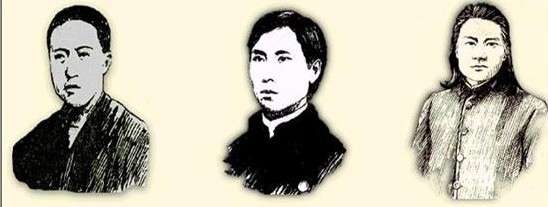
A、Wuchang Uprising——the Brewing and outburst of revolution
1、Background and Conditions
(1)Situation at the time:The conclusion of《The International Protocol of 1901》deepened the national crisis.
(2)Social basis:failure of the new deal and the preparatory constitution
(3)Economic basis:the growing of national capitalism (as being pushed by the “new deal” and the preparatory constitution)
(4)Class basis:The growing of national bourgeois that came onto the stage after the Sino-Japanese War.
(5)Ideological Basis:the dissemination of bourgeois democratic revolutionary ideas
(6)Organizational Basis:The establishment of bourgeois organizations and political parties such as Xingzhonghui (Society for Reviving China、Tongmenghui (Society of Alliances) and etc
(7)Organizational Basis:The establishment of bourgeois organizations and political parties such as Xingzhonghui (Society for Reviving China、Tongmenghui (Society of Alliances) and etc.
| Time of Formation |
Name |
Component |
Leaders |
| 1894 |
Xingzhong-hui |
Oversea Chinese & Secret Societies |
Sun Yat-sen |
| 1904 |
Huaxinghui |
Overseas students & the education field |
Huang Xing, Song Jiaoren |
| 1904 |
Guangfuhui |
Overseas students & the education field | Cai Yuanpei |
| 1906 |
Rizhishe |
the education field & the new army |
Liu Jingan |
The 1st Bourgeois Organization of China——Xingzhonghui was formed in 1894 in Honolulu
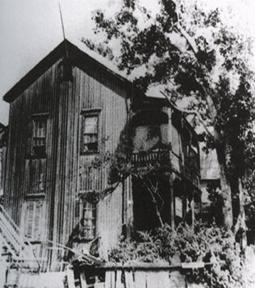
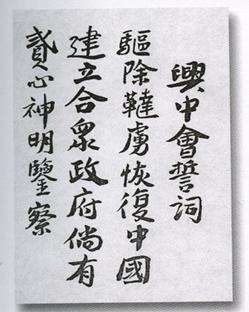
•The pledge of Xingzhonghui
Formation of Xingzhonghui:
Time:1894
Founder:Sun Yat-sen
Place:Honolulu, USA
Nature:China’s first bourgeois democratic revolutionary organization
Pledge:“To expel the Qing Rulers, restore China, and establish a united government.”
Objective:To overthrow the rule of the Qing Dynasty and establish a bourgeois republic.
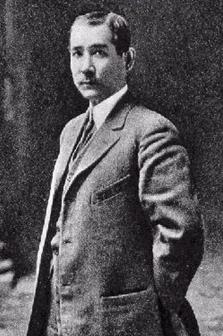
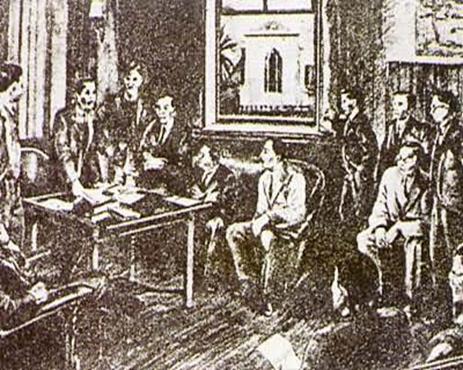
Xingzhonghui
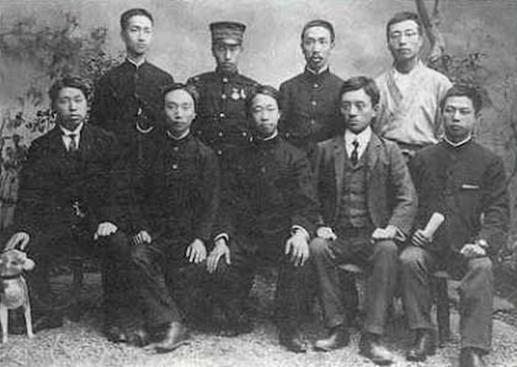
Xingzhonghui
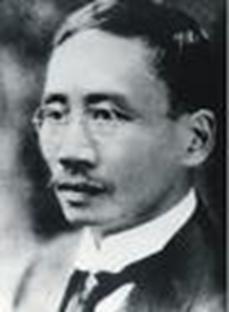
Cai Yuanpei
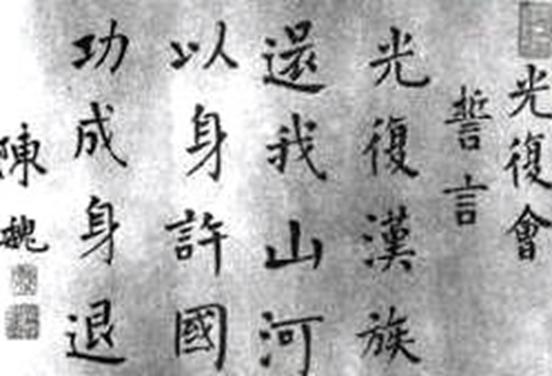
Guangfuhui
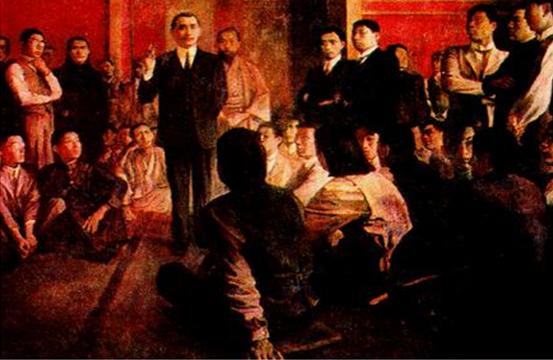
The Founding of Tongmenghui (Society of Alliances)
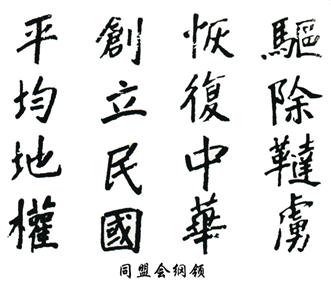
The Founding of Tongmenghui (Society of Alliances)
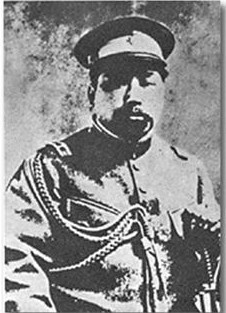
The Founding of Tongmenghui and its Significance
A、Time: Aug.,1905
B、Place: Tokyo, Japan
C、Composition: Members of Xingzhonghui,
Huaxinghui and Guangfuhui
D、Platform: “To expel the Qing Rulers, restore China, and establish a republic and equal share of land”
E、Leaders: Sun Yat-sen、Huang Xing
F、Journal: 《The eople》
G、Nature: The first nation-wide unified bourgeois political part
H: Significance: Marked a new phase of bourgeois revolution
The Core of the Three Principles of the People
Nationalism:“To expel the Qing Rulers and restore China”
Democracy:“To found the republic” (The core thinking)
Welfare:“Equal share of land”
A、Wuchang Uprising——the Brewing and outburst of revolution
1、 Background and Conditions
(1)Situation at the time:The conclusion of《The International Protocol of 1901》deepened the national crisis.
(2)Social basis:failure of the new deal and the preparatory constitution
(3)Economic basis:the growing of national capitalism (as being pushed by the “new deal” and the preparatory constitution)
(4)Class basis:The growing of national bourgeois that came onto the stage after the Sino-Japanese War.
(5)Ideological Basis:the dissemination of bourgeois democratic revolutionary ideas
(6)Organizational Basis:The establishment of bourgeois organizations and political parties such as Xingzhonghui (Society for Reviving China、Tongmenghui (Society of Alliances) and etc.
(7)Military Basis:Revolutionaries held a series of armed uprisings.
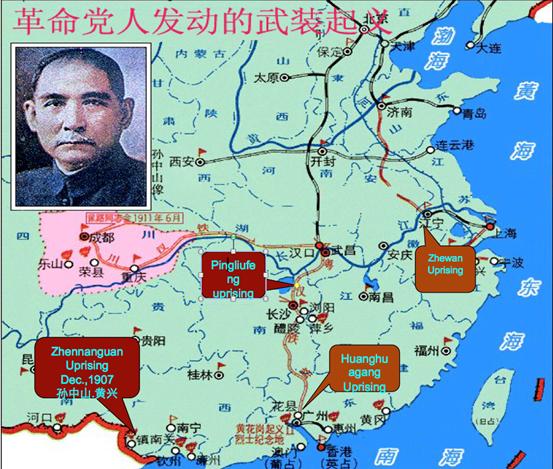
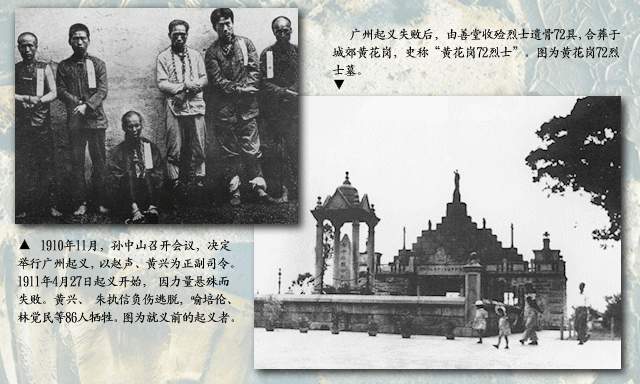
黄花岗起义
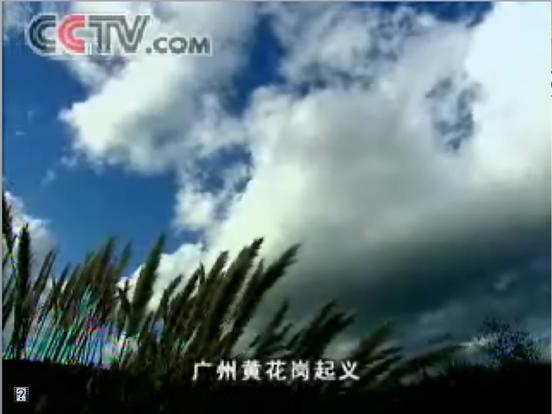
A、Wuchang Uprising——the Brewing and outburst of revolution
1、 Background and Conditions
(1)Situation at the time:The conclusion of《The International Protocol of 1901》deepened the national crisis.
(2)Social basis:failure of the new deal and the preparatory constitution
(3)Economic basis:the growing of national capitalism (as being pushed by the “new deal” and the preparatory constitution)
(4)Class basis:The growing of national bourgeois that came onto the stage after the Sino-Japanese War.
(5)Ideological Basis:the dissemination of bourgeois democratic revolutionary ideas
(6)Organizational Basis:The establishment of bourgeois organizations and political parties such as Xingzhonghui (Society for Reviving China、Tongmenghui (Society of Alliances) and etc.
(7)Military Basis:Revolutionaries held a series of armed uprisings.
(8)Conditions:Wuhan became the cradle of the revolution
(9)Opportune timing:Not many troops left in Wuhan, they were sent to Sichuan to cope with the matters over there.
Earth-shaking Actions
(The Process of the Revolution)
A、Wuchang Uprising——the Brewing and outburst of revolution
1、 Background and Conditions
2、Outburst ( Oct. 10,1911 )
2、The outburst
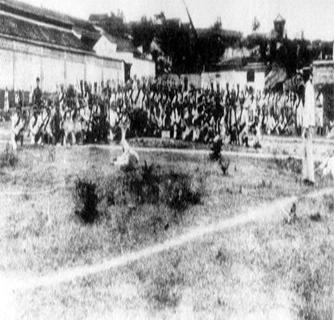
Uprisers occupied the arsenal at Chuwangtai on the night of Oct. 10,1911.
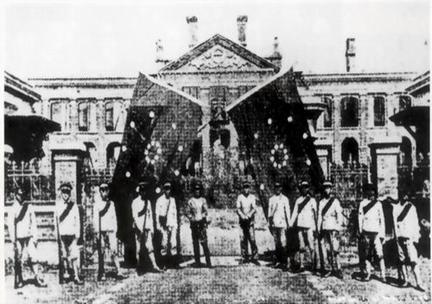
Hubei Military Government was formed on Oct. 11, 1911
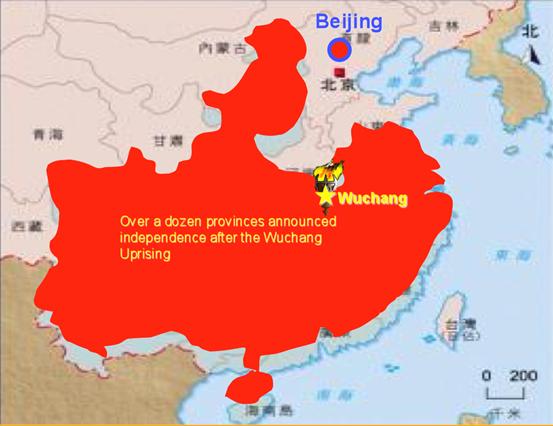
The national situation after the Uprising
A、Wuchang Uprising——the Brewing and outburst of revolution
1、 Background and Conditions
2、Outburst:
(1)Time: October 10,1911
(2)Main Force: Revolutionaries in the New Army in Hubei
(3)Results: Took over Wuchang,formed the military government,changed the name of the country into a republic
(4)Influence: The rule of the Qing Dynasty collapsed after over a dozen provinces declared independence.
A、Wuchang Uprising——the Brewing and outburst of revolution
1、 Background and Conditions
2、Outburst (Oct.10, 1911)
B、Founding of the Republic——Climax of the revolution
1、Founding of the Republic of China
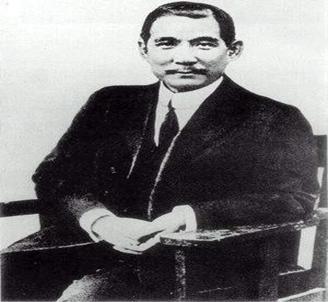
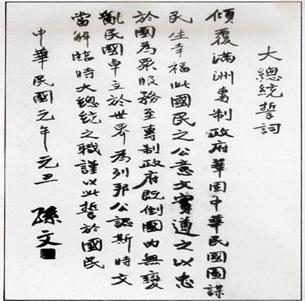
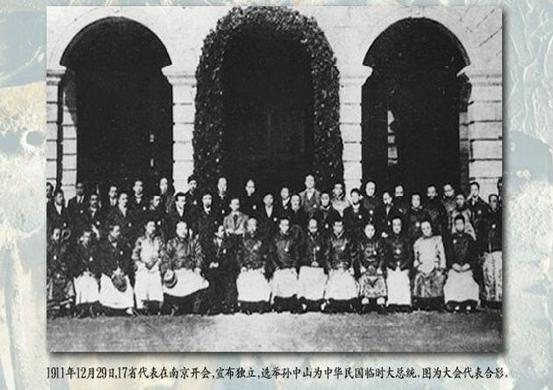
Sun Yan-sen sworn in as President Provisional of the Republic of China in Nanjing Five Colors represent Han, Manchu, Mongolian, Hui and Tibetan nationalities, a symbol of “Republic of the five of them”.Information:Key members of the Nanjing Provisional government President Provisional:Sun Yat-sen, Foreign Minister:Wang Chonghui General Commander of Army:Huang Xing Minister of Education:Cai Yuanpei, Chief of Staff: Huang Xing,SecretaryGeneral: Hu Hanmin Director-General, Bureau of Legal Affairs:Song Jiaoren; Director General, Mint of China: Huang Fuxing
(The above are all members of the Society of the Alliances,in each ministry, all, except one vice minister, were all members of the Society.)
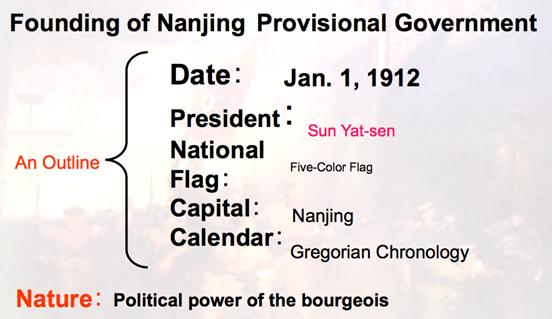
AA、Wuchang Uprising——the Brewing and outburst of revolution
1、 Background and Conditions
2、 Outburst:
B、Founding of the Republic——Climax of the revolution
1、Founding of the Republic of China
2、《Provisional Law of the Republic of China》
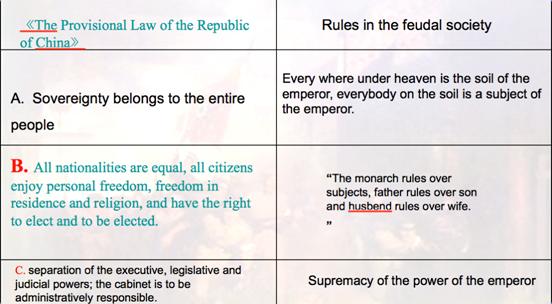
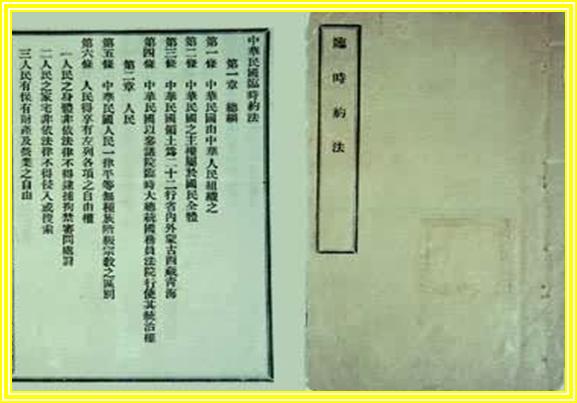
A Book of the Provisional Law
《Provisional Law of the Republic of China》
(1)contents
1 、Sovereignty belongs to the entire people (Sovereignty rests in the people)
2 、All nationalities are equal(Freedom &equality)
3、Rights of the people
4、separation of the executive, legislative and judicial powers;(Separation of three powers)
5、The cabinet is held responsible for administrative matters.
(2)nature: China’s first bourgeois democratic constitution
(3)Purpose: To contain the autocracy of Yuan Shikai and maintain the republic system
(4)Effects: Progressiveness in anti feudal tyranny
A、Wuchang Uprising——the Brewing and outburst of revolution
1、Background and Conditions
2、 Outburst Oct. 10, 1911
B、Founding of the Republic——Climax of the revolution
1、Founding of the Republic of China
2、《Provisional Law of the Republic of China》
C. Ending of Xinhai Revolution
1、Yuan Shikai usurped the fruits of revolution
Situation before and after the formation of the provisional government
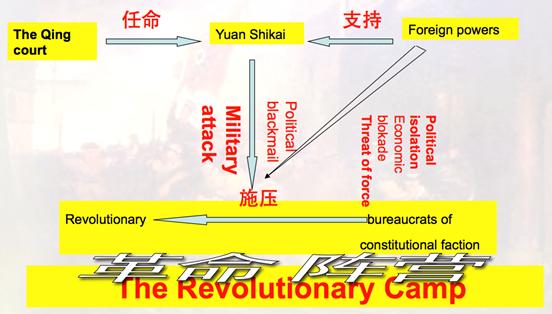
C. The Ending of Xinhai Revolution
1、Yuan Shikai usurped the fruits
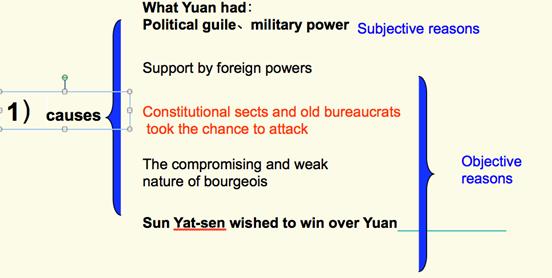
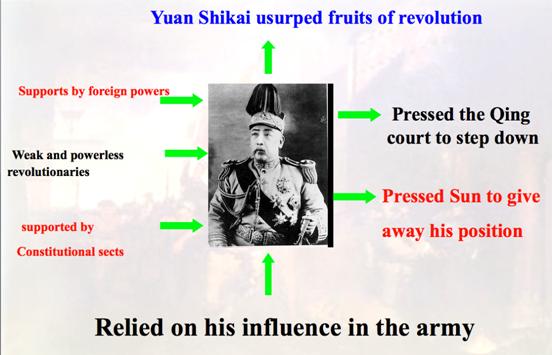
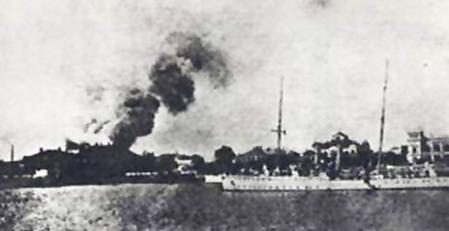
More foreign warships anchored along the Yangtze River after the outbreak of Xinhai Revolution.
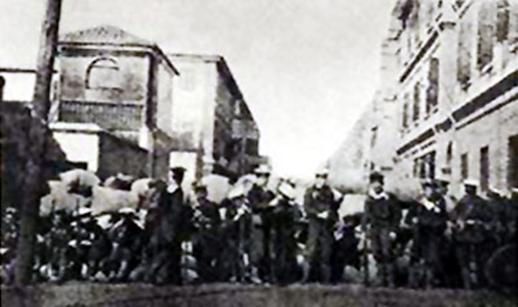
Foreign navy soldiers reinforcing strongholds in the concession in Hankou after the outbreak of the Xinhai Revolution.
“……Yuan Shikai is not good, but we should hope he is good, we should give him sincere advice, tight supervision to move him, encourage him, so that he could not but be good……”
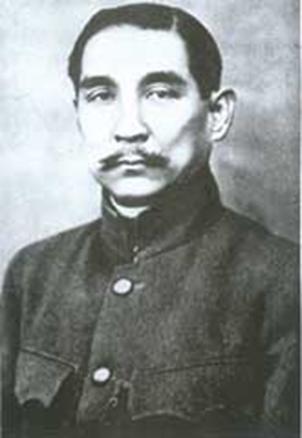
Would you do like this?
C. Ending of the Revolution
1、Yuan usurped the fruits
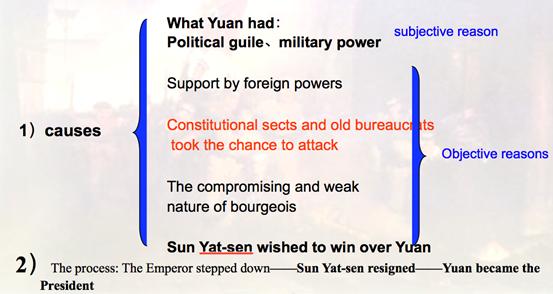
The Emperor of the Qing Dynasty stepped down in February, 1912. The monarchy that existed for over 2,000 years thus came to an end.
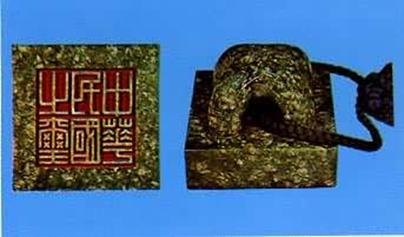
Jade Seal of the Emperor
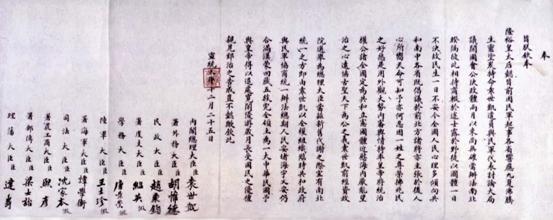
The Edict on the Abdication of the Emperor
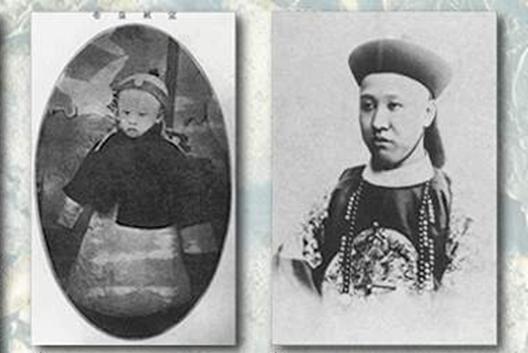
Bu Yi Prince Regent Zhai Feng
When in 1908 the three-year old Bu Yi was being crowned, he was in a blubber, so his father, the Prince Regent, Zhai Feng coaxed him by saying, “stop that, it will be over in a minute, it will be over!” Hearing this the officials at the court whispered, “how can he say that?” They all took it as a bad omen without realizing that within three years the Qing court came to an end.
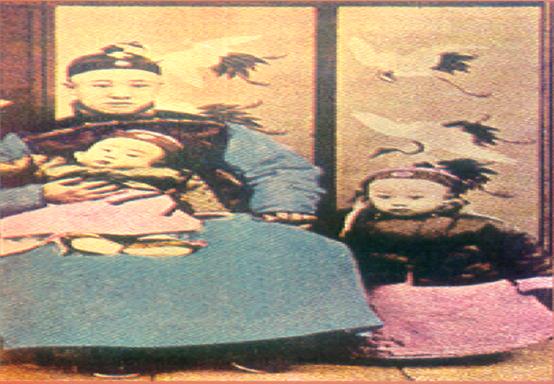
On February 1912, the last Emperor of the Qing Dynasty (the one standing in the photo) issued an Edict to declare his abdication, and the feudal monarchy system in China came to an end.
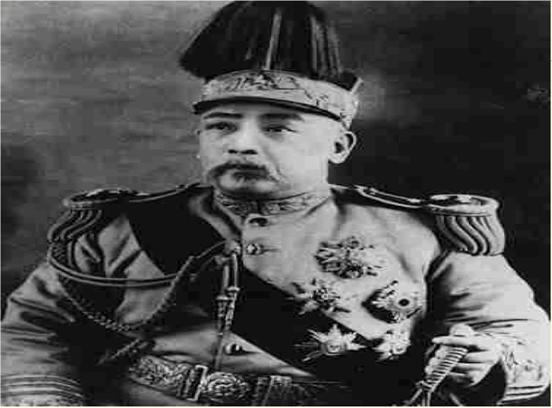
In March 1912, Yuan Shikai became the President provisional in Beijing. The revolutionary fruits were thus usurped by Yuan Shikai.
A.
B.
C. The Ending of the Xinhai Revolution
1、Yuan Shikai usurped the fruits
2、Historical merits of the revolution
Historical Merits
2、Historical Merits of the Revolution Nature A great anti-imperialist, anti-feudal bourgeois democratic revolution in the modern history of China.
Merits
1、Overthrew the feudal rule of the Qing and ended the monarchy system that existed for over 2,000 years.
2、Established the bourgeois republic and the concept of democratic republic was widely accepted.
3、A heavy blow on the feudal and imperial rule in China
4、Created favorable conditions for the development of national capitalism.
5、An important part and a driving force for the national emancipation movement in Asia.
A、
B、
C、The Ending of the Xinhai Revolutio
1、Yuan Shikai usurped the fruits
2、Historical merits of the revolution
3、Failure of Xinhai Revolution
1)Signs of Failure:
Revolutionary fruits were usurped by Yuan Shikai;The anti-imperialist and anti-feudal task has not been completed;The nature of the society—semi-colonial and semi-feudal society has not been changed
2)Reasons:
Subjective: Capitalist economy had not been developed to its full The weak and compromising nature of bourgeois Objective:reactionary forces home and abroad joined hands in sabotage and suppression of the revolution
3)Lessons
Because of the weak and compromising nature of the bourgeois, the solution of bourgeois republic couldn’t work in the semi-colonial and semi-feudalist China.
Why do we say the bourgeois was weak and compromising
(1)There wasn’t a platform that was thoroughly anti-imperialism and feudalism.
(2)Failed to tackle the land issue for farmers, unable to get support from the masses of the people and was lonely and isolated.
(3)Tongmenghui—the Society of Alliances was fragile and weak.
(4)They didn’t have their own armed forces.The Success and Failure of Xinhai Revolution
1、To determine the success or failure of a revolution, we should see if the fundamental purpose of the revolution or the pre-set objective have been attained.
2、The fundamental purpose was to over throw the imperialist oppression and eradicate the feudalist system.
3、The direct objective was to overthrow the Qing court and establish a republic with the bourgeois rule.
It was a success Because it established the Republic of China and promulgated “The Provisional Law of the Republic of China”, the concept of democratic republic was widely accepted; the Qing Dynasty feudalist rule was overthrown and the monarchy system that existed for over 2,000 year came to an end It was a failure Because the ant imperialist and anti-feudal task had not been completed; China was still a semi-colonial and semi-feudal society
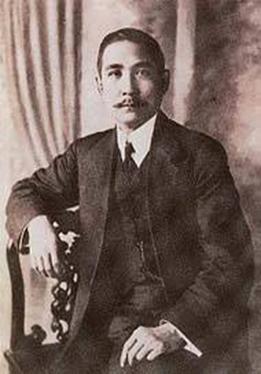
The nation awakened because of him
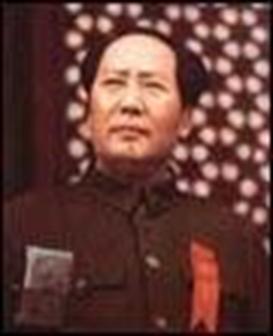
The nation stood up Because of him
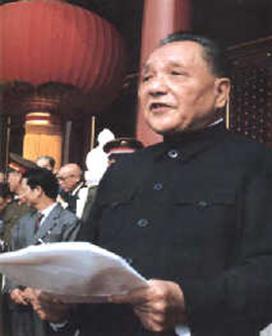
The nation becomes rich because of hime revolution has not been completed yet, comrades should still work harder!Great men in the minds of teenagers in the republican period
1913年对300名中小学生的调查显示,他们崇拜的人物依次为:孔子、孟子、孙中山、颜渊、诸葛亮、范仲淹、岳飞、王阳明、黎元洪、华盛顿。
A survey was done to 300 middle and primary school students in 1913, asking them who in their minds was a great man, the answer in order of Their favor were: Confucius, Mencius, Sun Yat-sen, Yan Yuan, Zhuge Liang, Fan Zhongyan, Yue Fei, Wang Yangming, Li Yuanhong and Washington.
Yan Yuan—a disciple of Confucius. Zhuge Liang—a statesman of the three Kingdoms Period. Fan Zhongyan—man of letters and a statesman of the Northern Song period. Yue Fei—a national hero in the southern Song period. Wang Yangming—a man of letters and a thinker of the Ming Dynasty. Li Yuanhong—twice the president of the Republic.
A Survey after the Xinhai RevolutionA table whom the students worshipped done at the No. 1 Normal School of Jiangsu in 1913
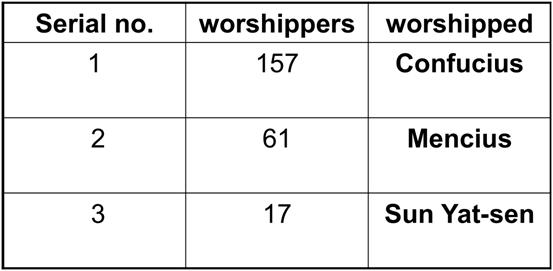
Summary
The Xinhai Revolution occupies an important position in the modern history of China, it is a great milestone of the Chinese people in their struggle to change their fate. The success and failure of the revolution will be tested by history. It is carved in the relief sculpture on the monument to the heroes of the people. The historical merits of Dr. Sun Yat-sen who led this revolution will inspire the sons and daughters of China to devote their efforts and wisdom to the advancement of the nation
